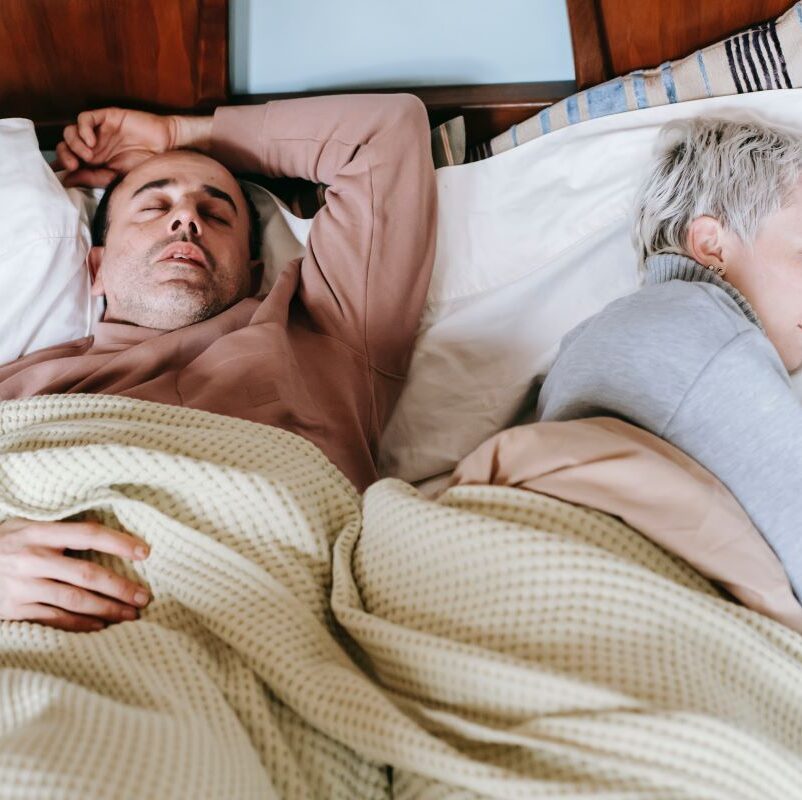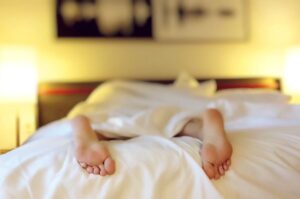
As the sun sets and the world around us settles into a peaceful slumber, many older Americans find themselves grappling with a frustrating problem: trouble sleeping at night. While their younger counterparts may easily drift off into dreamland, many people ages 50 plus face an array of sleep-related challenges that can leave them feeling exhausted and restless.
From insomnia to sleep apnea, navigating the nocturnal hours becomes a nightly battle for these seniors, impacting not only their physical health but also their overall well-being.
As an individual who has had trouble sleeping for night for many years, exploring the various factors contributing to this pervasive issue and delving into potential solutions is a topic near and dear to my heart.
Seniors and Trouble Sleeping at Night
One of the most common complaints among seniors is having trouble sleeping at night. As we age, our sleep patterns tend to change, and many older adults find it increasingly difficult to fall asleep and stay asleep throughout the night. This can have a significant impact on their overall health and well-being.
There are several reasons why seniors may experience trouble sleeping at night. One factor is the natural decline in melatonin production that occurs with age. Melatonin is a hormone that helps regulate our sleep-wake cycle, and decreased levels can make it harder for many people to fall asleep.
Additionally, medical conditions such as chronic pain, respiratory disorders, or neurological issues can also contribute to disrupted sleep.
Addressing these sleep woes is crucial for an overall quality of life. Establishing a regular sleep routine and creating a comfortable sleep environment can help promote better rest.  Furthermore, incorporating relaxation techniques like meditation or gentle stretching before bed could aid in reducing anxiety or physical discomfort that often disrupts older adults’ slumber.
Furthermore, incorporating relaxation techniques like meditation or gentle stretching before bed could aid in reducing anxiety or physical discomfort that often disrupts older adults’ slumber.
By understanding the unique challenges seniors face when it comes to trouble sleeping at night, effective solutions can be found that promote healthy rest.
Common Sleep Issues Among Seniors
As we age, it’s common for sleep patterns to change, and many seniors find themselves facing various sleep issues. One common issue is insomnia, which can make falling asleep and staying asleep a constant struggle. This may be due to factors such as chronic pain, medication side effects, or an underlying health condition.
Additionally, seniors often experience sleep apnea, a condition where breathing repeatedly stops and starts during sleep. The interruption in oxygen flow can lead to frequent awakenings throughout the night and leave seniors feeling exhausted during the day.
Another prevalent sleep issue among seniors is restless leg syndrome (RLS), which manifests as uncomfortable sensations in the legs that are alleviated only by movement. While RLS can affect individuals of any age group, seniors are more susceptible due to factors like iron deficiency or certain medications.
The urge to constantly move their legs disturbs their sleep and prevents them from achieving deep restorative rest. Furthermore, older adults commonly struggle with anxiety or depression, both of which can contribute to disturbed sleep patterns and make it difficult for them to achieve a peaceful night’s rest.
Finally, urinary incontinence can be a factor with trouble sleeping at night. Many people report that they have to awaken every two to three hours to use the bathroom, and then struggle to fall back asleep afterword.
Understanding these common sleep issues among seniors is crucial in order to provide appropriate support and care for aging loved ones.
By recognizing the causes behind insomnia, sleep apnea, restless leg syndrome, incontinence, or mental health struggles like anxiety or depression that disrupt senior’s sleeping patterns; family members and healthcare professionals alike can seek out effective solutions tailored specifically for each individual case.
Causes of Insomnia in Older Adults
Insomnia is a common sleep disorder that affects people of all ages, but it becomes more prevalent in older adults. There are several factors that contribute to insomnia in this population. One significant cause is underlying medical conditions. Chronic pain, arthritis, heart disease, and respiratory disorders can all disrupt sleep patterns and make it difficult for older adults to fall asleep or stay asleep throughout the night.
 Another factor that contributes to insomnia in older adults is psychological stress. Life changes such as retirement, loss of loved ones, or financial difficulties can lead to increased levels of stress and anxiety. These emotional concerns often manifest at nighttime, making it challenging for older individuals to relax their minds and get the rest they need.
Another factor that contributes to insomnia in older adults is psychological stress. Life changes such as retirement, loss of loved ones, or financial difficulties can lead to increased levels of stress and anxiety. These emotional concerns often manifest at nighttime, making it challenging for older individuals to relax their minds and get the rest they need.
Additionally, lifestyle choices can influence insomnia in older adults. Consuming caffeine or alcohol close to bedtime can interfere with the sleep-wake cycle and prevent restful sleep. Eating spicy food at night can also create heartburn, which can also keep people up.
Poor sleeping environment and irregular sleep schedules can also contribute to the development of insomnia.
Understanding these causes can help healthcare professionals develop targeted interventions for managing insomnia in older adults and improve their overall quality of life.
Impact of Poor Sleep on Seniors’ Health
As we age, our sleep patterns often change, and many older individuals have trouble sleeping at night. However, it is essential to understand the significant impact poor sleep can have on overall health. One immediate effect of inadequate sleep is a decrease in cognitive function.
Studies have shown that lack of proper rest can lead to difficulties in concentration, memory loss, and even an increased risk for developing dementia.
Furthermore, poor sleep has been linked to cardiovascular problems among seniors. Individuals who consistently experience disrupted or insufficient sleep are more likely to develop hypertension and heart disease. Additionally, inadequate rest can also compromise the immune system’s function, making older adults more susceptible to infections and illnesses like the common cold or flu.
Given these potential consequences for overall health, it becomes crucial to address the issue of poor sleep and provide support and resources for older individuals struggling with insomnia or other sleeping disorders.
By encouraging healthy bedtime habits such as establishing consistent routines and creating a comfortable sleeping environment tailored to their needs, the negative impact of inadequate rest on seniors’ overall well-being and quality of life can be mitigated.
3 Tips for Improving Sleep Quality in Seniors
Establish a Consistent Sleep Schedule
Individuals who have trouble sleeping at night should strive to create a regular sleep routine by going to bed and waking up at the same time every day, even on weekends. This helps set the body’s internal clock, making it easier to fall asleep and wake up naturally. Additionally, incorporating relaxing activities before bed, such as reading or taking a warm bath, can signal to the brain that it’s time to wind down.
Optimize the Sleep Environment
Creating a comfortable sleeping environment is crucial for seniors with trouble sleeping at night. Make sure their bedroom is cool, quiet, and dark during sleep hours. Blackout curtains or eye masks can be useful in blocking light, while earplugs or white noise machines can help drown out any disruptive sounds. Investing in a supportive mattress and pillows that cater to specific comfort needs can also significantly improve sleep quality for seniors.
Encourage Regular Exercise
Engaging in regular physical activity has been proven beneficial for promoting better sleep among seniors. Encourage them to incorporate exercise into their daily routines – whether it’s walking outdoors, taking dance classes tailored for older adults, or practicing gentle yoga poses at home—all of these activities can help reduce anxiety levels and improve overall sleep patterns.
Importance of Seeking Medical Help for Sleep Problems
Seeking medical help for trouble sleeping at night is of utmost importance. Many older adults tend to dismiss their sleep disturbances as a normal part of aging or simply a minor inconvenience. However, overlooking these issues can have significant consequences on a person’s overall health and well-being.
Sleep problems, such as insomnia or sleep apnea, not only affect the ability to get a good night’s rest but can also lead to serious health conditions like heart disease, diabetes, and cognitive decline if left untreated.
 One fresh perspective on this matter is that addressing trouble sleeping at night requires an individualized approach. Each person may have unique factors contributing to their sleep difficulties, such as medication side effects, chronic pain conditions, or underlying mental health issues.
One fresh perspective on this matter is that addressing trouble sleeping at night requires an individualized approach. Each person may have unique factors contributing to their sleep difficulties, such as medication side effects, chronic pain conditions, or underlying mental health issues.
By seeking medical help, healthcare professionals specialized in sleep medicine can assess these factors and develop personalized treatment plans tailored to each person’s needs.
Additionally, it’s crucial to recognize that untreated sleep problems not only impact the individual but also those around them. Partners may suffer from disrupted sleep due to loud snoring or bed partner arousals caused by undiagnosed sleep disorders like obstructive sleep apnea.
Seeking medical help early on can prevent potential strain on relationships and improve overall quality of life for both partners involved.
Overall, understanding the importance of seeking medical help for sleep problems among seniors goes beyond just acknowledging the immediate benefits of better restful nights; it has far-reaching implications for long-term health outcomes and maintaining harmonious relationships within the household.
Addressing Sleep Issues Can Improve Senior’s Well-Being
Addressing trouble sleeping at night among individuals aged 50-and-up is crucial for improving their overall well-being. Lack of sleep can lead to a range of significant health problems, including cognitive decline, increased risk of falls, and compromised immune function. By actively addressing and finding solutions to these sleep issues, seniors can experience a dramatic improvement in their quality of life.
Going to bed and waking up at consistent times each day helps individuals regulate their internal clock and improves the chances of falling asleep quickly and staying asleep throughout the night.
My Sleepless Journey Woes
As I mentioned earlier, I have had trouble sleeping at night for years. It probably started about age 50 or so, now that I think about it. I have the combination of a perfect “storm” of impediments that have kept me from a good night’s sleep: My husband loves to watch TV in the bedroom (a practice I have ALWAYS loathed), he snores loudly and quite obnoxiously, and has sleep apnea. So, for starters, the deck is stacked against me, so to speak.
But even in a dark room without all those distractions, I still struggle with sleep issues. Maybe it is because I now find myself getting up (more than once) every night to urinate. I also struggle with “turning off” my mental thoughts and often lay awake at nights thinking (and worrying) about my three grown children. Does a mom every really stop doing that at any age?
Also, dogs are in our bedroom, and while I know that can be a bad habit, it’s what we do and we probably won’t try and move them elsewhere at this age and stage (theirs and ours).
Add in that my husband loves to sleep late in mornings when he doesn’t work, while I am an early riser, I have several strikes against me.
I’m trying different things and have talked to my family doctor as well. I only take my walks in the morning, resist caffeine-anything and alcohol late at night, watch my spicy or ultra-rich food intake, and try and maintain a consistent routine as much as possible. Late nights are now more in my past, like last night when I fell asleep on my husband’s lap after watching most of a VERY long movie.
Are you part of the “trouble sleeping at night” club, and if so, what do you do to sleep better? Any and all suggestions are welcomed! Contact us at anytime at contact@seniordenial.com.
Written by
Robin McClure
Robin is the author of 7 parenting books and has 3 grown children, 3 spoiled rescue dogs, and a very understanding husband. She holds a bachelor's degree in journalism and a master's degree in communications, and spends her time writing, drinking coffee, and planning the next grand adventure.



